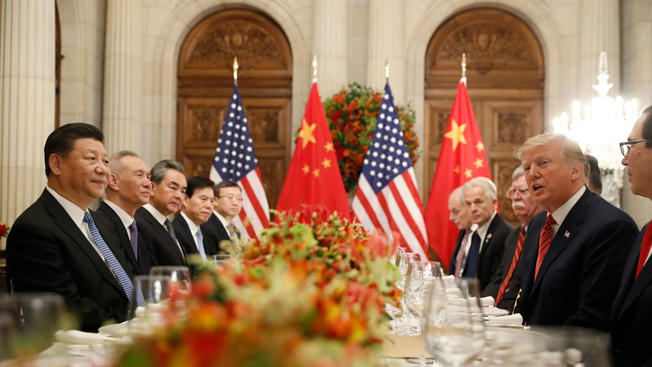BEIJING: China said on Monday it will raise tariffs on $60 billion worth of US goods from 1 June, in retaliation for the latest round of US tariff hikes and Washington’s plans to target almost all Chinese imports.
The announcement came after the latest round of US-China trade negotiations ended on Friday without a deal, and after Washington increased tariffs on $200 billion worth of Chinese products.
US President Donald Trump had also ordered the start of a process to impose new duties on another $300 billion worth of Chinese items.
China’s rates will target a number of American imports with tariffs rising to as high as 25%, according to a statement by the Tariff Policy Commission of the State Council – China’s cabinet.
“China’s adjustment of tariff-adding measures is a response to US unilateralism and trade protectionism,” the statement said, adding that it hoped the US would work with China towards a “win-win agreement”.
Despite the retaliation, Beijing appeared to give time to find a resolution by setting the 1 June date.
The announcement sent Wall Street stocks plunging on Monday, with losses on the tech-rich Nasdaq exceeding 3%, while the Dow Jones Industrial Average and broad-based S&P 500 both were both down 2.5% toward 1800 GMT.
Most observers have warned a trade war between the world’s two largest economies could shatter global economic growth, and hurt demand for commodities like oil.
The Chinese response was announced soon after Trump warned Beijing not to retaliate.
MORE OPTIONS FOR CHINA
“China should not retaliate-will only get worse!” the US president wrote in a series of tweets on trade.
But Beijing appeared to dig in.
“China will never surrender to external pressure,” foreign ministry spokesperson Geng Shuang said at a regular briefing on Monday.
In addition to tariff hikes, China could also use other measures to hit back at the United States, as it imports fewer US products – which limits its ability to match tariffs dollar-for-dollar.
“China may stop purchasing US agricultural products and energy, reduce Boeing orders and restrict US service trade with China,” Hu Xijin, editor of China’s state-run Global Times, tweeted.
“Many Chinese scholars are discussing the possibility of dumping US Treasuries and how to do it specifically.”
Beijing is the biggest holder of US debt, and Bloomberg News estimated last year that the Chinese state held around $1.2 trillion’s worth.
US Treasury Secretary Steven Mnuchin told reporters on Monday he believed China would continue to buy US debt.
“I assume so. It’s a good investment,” he said, adding that no date had yet been set for a further round of negotiations to be held in Beijing.
Both sides have indicated that discussions will continue. Beijing’s top trade negotiator, Liu He, likewise said on Friday the next round would start in the Chinese capital at an unspecified date.
“As for the trade war launched by the US side, China has long expressed that it is unwilling to fight, but it is not afraid to fight, and it has to fight when necessary,” China’s main broadcaster, the state-run CCTV, added.
Aircraft manufacturer Boeing later said it remained “confident” US-China trade talks would yield an agreement.
CONTACT CONTINUES
In a previous round of tit-for-tat moves, the US imposed 10% tariffs on $200 billion worth of Chinese imports in September.
Beijing announced shortly after that it was hitting more than 5,000 categories of US products with tariffs of five to 10%.
White House economic adviser Larry Kudlow told US media on Sunday that Trump and Chinese President Xi Jinping could meet next month on the sidelines of the G20 summit to hash out their differences on trade, although no new talks are scheduled.
“The two presidents maintain contact through various means,” the Chinese foreign ministry spokesperson said, without confirming a possible meeting between the two leaders.
Beijing has so far imposed tariffs on $110 billion worth of American goods in retaliation for the US duties.
Trump had already hit a further $50 billion in Chinese goods with tariffs of 25% last summer.
The US leader began the standoff last year because of complaints about unfair Chinese trade practices.
The United States is pressing China to change its policies on protections for intellectual property, as well as massive subsidies for state-owned firms, and to reduce the yawning trade deficit.
Since last year the US and China had exchanged tariffs on two-way trade worth hundreds of billions of dollars, gutting US agricultural exports to China and weighing on both countries’ manufacturing sectors.




